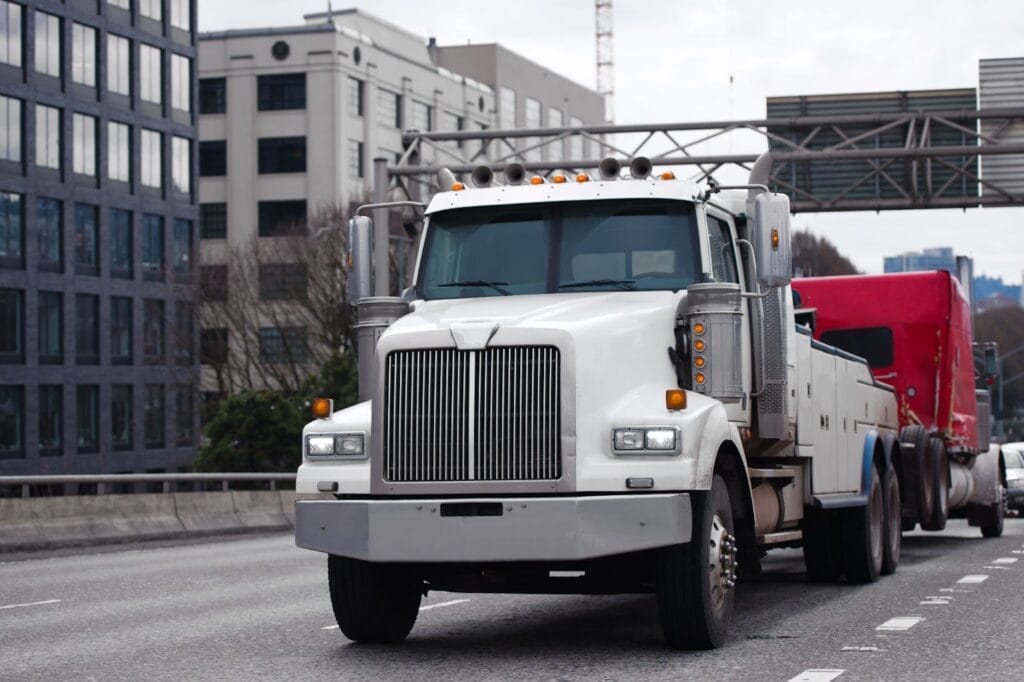Gross Weight vs. Dry Weight: Definitions, Acronyms, and Factors that Affect Towing Capacity

Understanding the difference between gross and dry weight can be confusing, especially when it involves vehicle towing capacity. Did you know that these weights differ greatly and affect how much load your vehicle can legally carry?
This article clarifies the differences by defining key terms, explaining common industry acronyms, and discussing factors influencing towing capabilities.
Gross Weight Defined
Gross weight refers to the total mass of a vehicle or trailer, fully packed with all its contents, including cargo, fluids, and passengers. It’s also known as Gross Vehicle Weight (GVW) in many industries.
The manufacturer determines this maximum limit for safety reasons while considering elements like braking capacity and suspension strength. Maintaining gross weight is crucial for adhering to legal restrictions and ensuring a safe journey when towing heavy loads.
Dry Weight Defined
Defining dry weight is crucial in understanding vehicle metrics. It represents the actual heft of a vehicle or trailer when all additional elements are stripped away. Things such as fuel, fluids, cargo, passengers, and optional equipment do not factor into dry weight calculations.
So the ‘bare-bones’ figure determines your initial payload capacity before loading up for your journey.
Common Industry Acronyms
It’s essential to understand Industry acronyms, such as GVWR, UVW, GVW, GTW, and GAWR when it comes to towing capacity. Learn what these acronyms mean and how they impact your vehicle’s capabilities.
Keep reading to gain a comprehensive understanding of the terms that matter in the world of towing.
GVWR
GVWR, short for Gross Vehicle Weight Rating, marks the utmost weight a vehicle can handle, including passenger and cargo weight as well as tongue weight. It’s vital in determining towing capabilities and preventing potential overloading or damage to vehicles. Knowing your GVWR guarantees safer travel practices on any journey.
UVW
The acronym UVW stands for Unloaded Vehicle Weight, which refers to the weight of a vehicle or trailer as it is built at the factory without any additional cargo or fluids. Essentially, it’s what the vehicle weighs before anything else is added.
This weight includes standard equipment and essential fluids such as fuel and oil. Understanding the UVW of a vehicle or trailer is important when determining its towing capacity because it provides a baseline for how much weight can be safely added without exceeding maximum limits.
GVW
GVW stands for Gross Vehicle Weight and refers to the total weight of a vehicle, including passengers, cargo, and fuel. It is an important factor to consider when determining the towing capacity of a vehicle.
The GVW includes the vehicle’s empty weight and any additional weight it carries. To calculate the GVW, you add the curb (empty) weight to the payload (passengers, cargo, etc.).
Understanding your vehicle’s GVW is essential for safe towing, as exceeding this weight limit can compromise performance and safety on the road.
GTW
GTW stands for Gross Trailer Weight, which is the total calculated weight of a trailer and its cargo. It’s an important measurement to consider when towing, as exceeding the GTW can strain your tow vehicle and compromise safety.
To determine the GTW, you need to weigh your fully loaded trailer with all its contents. This includes everything from camping gear to water tanks. Understanding and staying within the recommended GTW for your specific tow vehicle is crucial for a smooth and safe towing experience.
GAWR
When you want to know how much weight a vehicle can tow, you need to know what GAWR means. This is a short way of saying Gross Axle Weight Rating, which is the highest amount of weight that can go on a vehicle’s front or back axles.
This rating helps determine how much weight your vehicle can safely carry without straining the axles. By following GAWR specifications provided by the manufacturer, you can ensure both safety and optimal performance while towing.
Gross Weight and Dry Weight Impact on Towing Capacity
Understanding the impact of gross weight and dry weight on towing capacity is essential for safe and efficient towing. Gross weight refers to the total weight of the vehicle, passengers, cargo, and trailer, while dry weight represents the weight of the vehicle without any additional load or fluids.
The difference between these two weights can significantly affect a vehicle’s towing capacity. Factors such as proper weight distribution and the capability of the vehicle to handle heavy loads also play a crucial role in determining towing capacity.
By considering these factors along with acronyms like GVWR (Gross Vehicle Weight Rating) and GCWR (Gross Combined Weight Rating), you can accurately assess your vehicle’s ability to handle different weights for safer towing experiences.
Maximum Weight Limit on Vehicle Towing Capacity

The maximum weight limit on a vehicle’s towing capacity is determined by its gross vehicle weight rating (GVWR). This refers to the vehicle’s total weight, including all cargo, passengers, and fluids.
To calculate the GVWR, subtract the vehicle’s dry weight from its maximum towing capacity. It is important to note that exceeding this weight limit can lead to safety issues such as poor braking performance and compromised stability while towing.
Calculating Gross Vehicle Weight Rating
To calculate a vehicle’s Gross Vehicle Weight Rating (GVWR), you need to consider several factors. The GVWR is the maximum allowable weight for a vehicle, including passengers, cargo, and fuel.
It’s an important factor in determining your vehicle’s towing capacity. To calculate the GVWR, start by finding your vehicle’s curb weight – this is its weight without any passengers or cargo.
Then add the weight of all occupants, including the driver and any additional passengers, along with any other items you plan to carry in the vehicle. Finally, don’t forget to factor in tongue weight if you tow a trailer.
Payload and Towing Capacity: What’s the Difference
Payload and towing capacity are two important terms to understand regarding vehicle capabilities. Payload refers to a truck’s weight in terms of cargo and passengers. In contrast, towing capacity refers to the maximum weight a truck can tow after considering its weight and any additional cargo.
It’s essential to note that these two capacities are separate entities, with the payload being what you can put inside or on the truck itself and towing capacity being what you can pull behind it.
Measuring Dry Weight on an RV or Camper
To measure the dry weight of an RV or camper, you need to subtract the weight of all fluids and passengers from the total weight. This includes empty waste tanks, fresh water tanks, fuel tanks, and any other fluids.
The resulting weight is known as the dry weight and is used to calculate towing capacity.
Reading Camper and RV Weight Numbers
Understanding how to read the weight numbers on a camper or RV is crucial for safe and efficient towing. These numbers can be found on the manufacturer’s label, providing valuable information about the vehicle’s weight limits.
The most important number to look for is the Gross Vehicle Weight Rating (GVWR), which represents the maximum permissible weight of the RV, including passengers, cargo, fluids, options, and accessories.
Additionally, pay attention to other weight ratings like GVW (Gross Vehicle Weight) and GAWR (Gross Axle Weight Rating) to ensure you stay within safe limits while towing.
How Dry and Gross Weight Affect Vehicle Performance
Dry weight and gross weight are two key factors that significantly impact a vehicle’s performance. The dry weight refers to the vehicle’s actual weight without any additional cargo, passengers, or optional equipment.
On the other hand, gross weight includes everything that is added to the vehicle, such as fuel, fluids, passengers, and cargo.
The weight of your vehicle directly affects its towing capacity and overall performance. Exceeding the maximum allowable gross weight can strain your engine and transmission, leading to decreased acceleration and potentially causing mechanical issues.
FAQs
Here are some frequently asked questions:
What is the difference between gross weight and dry weight?
Gross weight and dry weight are two crucial terms when it comes to understanding towing capacity. Gross weight refers to the total weight of a vehicle or trailer when fully loaded, including passengers, cargo, fluids, and optional equipment.
On the other hand, the dry weight is simply the weight of a vehicle or trailer without any cargo or fluids. Understanding these distinctions is important because calculating towing capacity often involves using the dry weight as a starting point.
By knowing both gross weight and dry weight, you can ensure that your vehicle or trailer stays within safe operating limits while on the road.
Is towing capacity dry weight or gross weight?
Towing capacity is not determined by either dry weight or gross weight alone. A separate measurement refers to the maximum weight a vehicle can tow safely. Dry weight represents the empty weight of a vehicle without any fluids or cargo, while gross weight includes all the fluids, cargo, and passengers.
Towing capacity depends on factors such as engine power, suspension, and braking system. It’s important to consider your vehicle’s towing capacity and specific weights when determining if it can safely tow a trailer or additional load.
What does dry weight mean on a trailer?
Dry weight on a trailer refers to the actual weight of the trailer without any additional items like fuel, fluids, cargo, passengers, or optional equipment. It is essentially the weight of the empty trailer when it comes from the manufacturer.
Also known as UVW or shipped weight, dry weight is a baseline for calculating how much additional weight can be safely added to the trailer. Understanding this term is crucial when determining towing capacity and ensuring safe and efficient practices.
Does RV dry weight include hitch weight?
The dry weight of an RV typically does not include the hitch weight. The term “dry weight” refers to the weight of the vehicle or trailer without fuel, fluids, cargo, passengers, or optional equipment.
Hitch weight is the downward force exerted on the tow vehicle’s hitch by the tongue of the trailer. While it can vary depending on factors like load distribution and design, it is generally not included in the dry weight calculation.
It’s important to keep this in mind when considering towing capacity and to ensure that your trailer’s total weight does not exceed your vehicle’s maximum limit.
Gross Weight vs. Dry Weight Calculations Conclusion
In conclusion, understanding the difference between gross weight and dry weight is essential for determining towing capacity. Gross weight refers to the total weight of a fully-loaded vehicle or trailer, while dry weight represents the base weight without fluids and cargo.
Factors such as GVWR, GAWR, GCWR, and payload are crucial in calculating towing capacity. By considering these definitions, acronyms, and factors, you can ensure safe and efficient towing for your vehicle.
